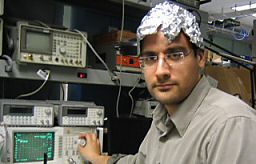
"It is claimed that the LIGO and LISA projects will detect Einstein's gravitational waves. The existence of these waves is entirely theoretical. Over the past forty years or so no Einstein gravitational waves have been detected. How long must the search go on, at great expense to the public purse, before the astrophysical scientists admit that their search is fruitless and a waste of vast sums of public money? The fact is, from day one, the search for these elusive waves has been destined to detect nothing." -- Stephen J. Crothers, astrophysicist, August 2009
New Scientist: Gravity Genius [sic]: How I Will Spend [i.e. waste] Half a Million Bucks [that could be used to save millions of people's lives in Africa].
Among this year's 23 recipients of the John D. and Catherine T. MacArthur Foundation's "genius award", who have won $500,000 each, no strings attached, is Nergis Mavalvala, a quantum physicist at the Massachusetts Institute of Technology and a collaborator on the Laser Interferometer Gravitational-Wave Observatory.
LIGO is on the hunt for gravitational waves, as-yet unseen ripples in space-time that are predicted by Einstein's theory of relativity and should be particularly strong when neutron stars or black holes merge. So what does a gravity hunter spend half a million dollars on? And what do gravitational waves have to do with quantum mechanics? To find out, New Scientist visited Mavalvala in her office at MIT.
Congratulations on the award. Was it at all expected?
Oh my goodness, no. When I got the call I thought it was a prank. I really thought at some point somebody was going to say, "Gotcha!"
How do you plan on using the award money?
It's hard to answer, with the few days I've had to think about it. I'll almost certainly spend some of the money on trying out far-out ideas. Scientists always have some ideas that are very risky: you know that they may not pan out, but if they did – wouldn't that be awesome? Those ideas are sometimes hard to get funded because they're so speculative.
Are there any particular topics on your risky wish list?
There's this idea that if you make a measurement on a quantum state you destroy it. But there are ways to get around that problem called quantum non-demolition techniques – these include ways to detect single photons repeatedly without destroying their delicate quantum states. The ideas are very sound but the implementations are quite difficult. My guess is the most likely place where an award like this would be used is in trying out these implementations and in seeing if our current technologies and knowledge can get us there.
A lot of your work has focused on using quantum mechanics to improve LIGO's ability to detect gravitational waves. What's the basic idea behind the experiment?
You take two laser beams at right angles to each other and you shoot them toward two mirrors, each one 4 kilometres away. If there is a gravitational wave, the mirror positions will change and we'll see that the light will take either a longer or a shorter time to go out and come back. Each detector can detect mirror motion that is a thousand times smaller than the size of a proton.
Why is quantum mechanics important in taking these measurements?
This all comes down to the idea that you use a light beam to measure the position of the mirror. We have very powerful laser beams, so there are a lot of photons. These photons carry momentum and there's some uncertainty in the momentum because they are quantum particles. This makes some uncertainty in your mirror position. One of the things that my group has done in the past few years is learn how to optically trap and cool a mirror, just the way people do optical trapping and cooling of atoms.
No gravitational wave has been directly detected yet. Why are they so hard to find?
Gravitational waves are weak, and they don't interact very strongly with our detectors. So that's the fundamental reason why it's so hard to do. The other problem is that we live on a very vibrant planet filled with motion, so everything you can imagine wants to move our mirror more than the gravitational wave.
Do you ever think about what it will be like when you do find one?
Pure ecstasy, probably. I think it will be amazing. But I think the first detections will very much go in the direction of understanding whether we've understood our instrument and making sure it really is a detection. It will probably be very much strengthened if the event we see is also seen by telescopes.
LIGO has been hunting for gravitational waves since 2002, and so far you haven't detected any. Is that at all discouraging?
No. It shouldn't be discouraging to anyone. We've always known that this first generation of instruments we would build for LIGO would have the sensitivity to see a gravitational wave only if it came from one of the strongest sources, and it would have to be from a very nearby source. We've always known that it was a bit of a long shot. What's going on now at LIGO is a very major upgrade called Advanced LIGO [set to begin observations in 2015]. If we haven't detected anything with this improved detector then I think disappointment and head-scratching will set in.














No comments:
Post a Comment